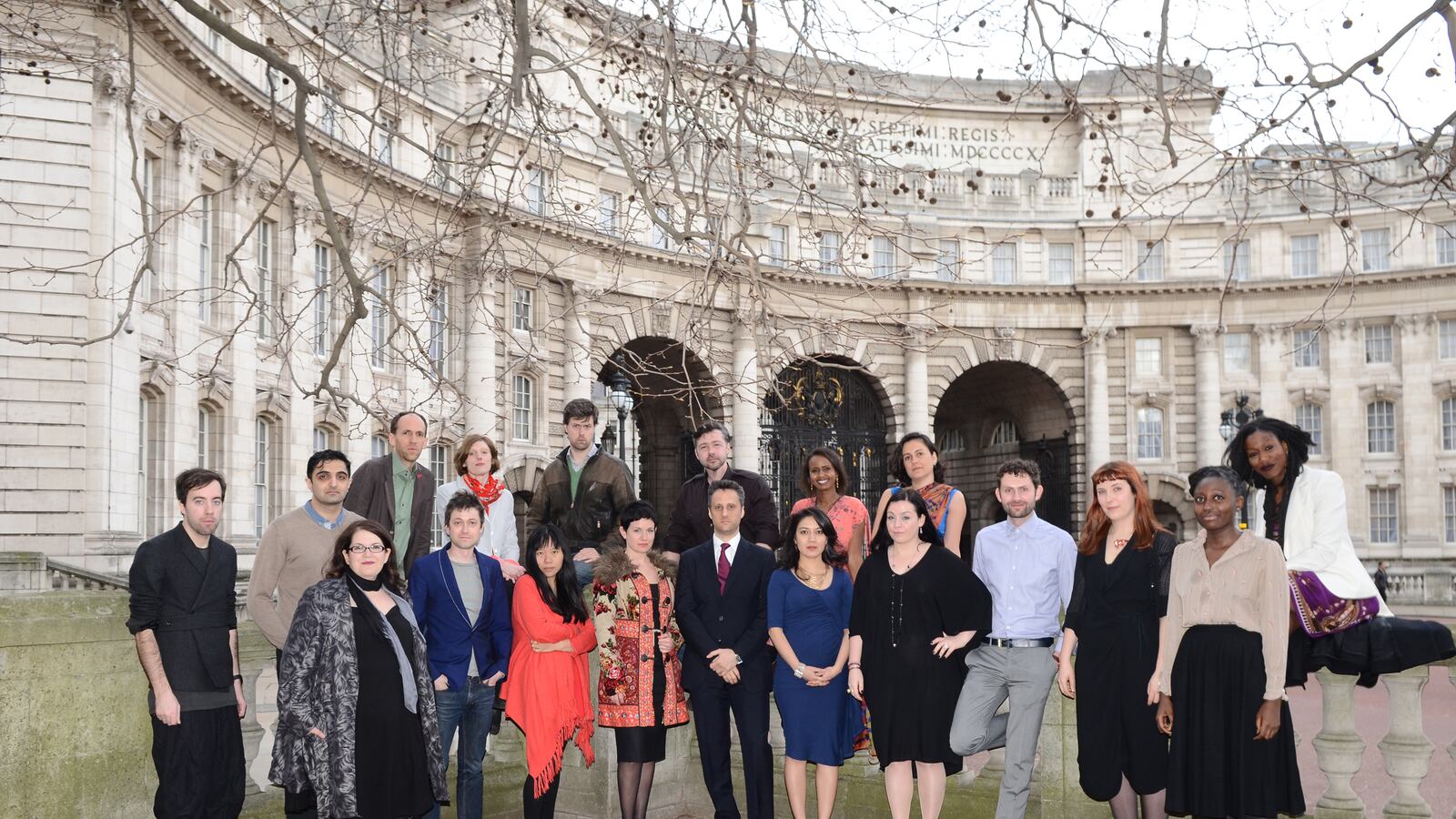Begun in 1983, with the now infamous list that included Martin Amis, Pat Barker, Julian Barnes, William Boyd, Ian McEwan, and Salman Rushdie, today’s announcement of the 2013 ‘Best of Young British Novelists is the fourth incarnation of Granta’s then editor and founder Bill Buford’s injection of adrenalin into the British literary scene that screamed an exciting new era of British literature.

A new list of twenty authors under the age of 40 has been announced every decade since. The idea is that these men and women define a generation of literary talent and should be the ones to watch for years to come. The 1993 and 2003 lists never quite packed the punch of the first, though the likes of Alan Hollinghurst, Hanif Kureishi, and Jeanette Winterson were included in ’93, and Zadie Smith, David Mitchell, and Sarah Waters ten years later.
Given that Granta’s list never narrows itself down in the way of other literary prize long/shortlists, a large part of our interest in it comes long after the event; the original list is lauded with increasing regularity precisely because Amis, Rushdie, and McEwan have been in the ascendance ever since. Unfortunately, the flourishing literary ecosystem of the early 80s is now all but extinct, and our 2013 bright young things are facing publishing’s uncertain future. The branch they and we should hold onto then is that of hope, a judging criterion that Granta Editor and one of this year’s judges John Freeman acknowledges is unique to this particular award alone: it’s “the only prize, if you can call it that, to be awarded on the basis of hope. We hope these novelists live up to the potential they have demonstrated so far.” And the Granta list’s USP doesn’t end there either; their definition of ‘potential’ is surprisingly fluid too. Rushdie, for example, had already won the 1981 Booker Prize for Midnight’s Children when he sat side by side with Kazuo Ishiguro, then with only a first novel to his name, on the ’83 list. Will Self made the cut in ’93 despite not technically having published a novel. While the ’03 list courted controversy because both Monica Ali and Adam Thirlwell’s then still-as-yet-unpublished books were read in manuscript form by the judges.
The ’83 and ’93 judging panels have, by and large, been proved fairly astute thus far. Bar the occasional disappearing act, like Buchi Emecheta from the ’83 list, or a writer’s career change (’93 winners Anne Billson’s shift towards film criticism and Philip Norman’s to music biographies), though it looks like novelist Hilary Mantel, one of the judges of the ’03 list, was onto something when she described that particular decade as “weaker than previous” ones. Indeed, looking back at the ’03 list today there’s a distinct split between the names that are still writing and those, like Susan Elderkin, Ben Rice, or Robert McLiam Wilson, who we have not heard much from.
So, what of the new list? Zadie Smith’s inclusion for the second time was pretty much a given – reviews of NW last year may have been somewhat mixed, but she’s one of the world’s most famous writers, not to mention a widely-read and respected public intellectual – but she’s also joined by Adam Thirlwell, author of Politics and The Escape, another ’03 author who’s made the cut again, matching only AL Kennedy, Ishiguro, and Adam Mars-Jones for frequency.
Unlike the previous list, every author is already published, even if, when it comes to Taiye Selasi’s Ghana Must Go which appeared just last month, only by a whisker (though she made her fiction debut with the short story ‘The Sex Lives of African Girls’ with Granta in 2011 and was championed by both Rushdie and Toni Morrison prior to publication). In fact, only six of the authors have just one novel under their belt: 36-year-old Jenni Fagan with The Panopticon, a gritty, warts-and-all portrait of her fifteen-year-old heroine’s time in a home for chronic young offenders; 38-year-old Steven Hall with The Raw Shark Texts; Somalia-born 31-year-old Nadifa Mohamed with Black Mamba Boy; Sunjeev Sahota, also 31, with Ours are the Streets; and 32-year-old Evie Wyld with Australian-set After the Fire, a Still Small Voice, a novel about a troubled relationship between a father and son, though her second novel, All the Birds, Singing, is forthcoming in June this year.
Instead of taking punts on new names, there’s actually an incredibly strong prize-winning heritage amongst the writers chosen. Some of the more notable achievements include the Commonwealth Writers’ Prize for Best First Book for Tahmima Anam’s first novel, A Golden Age, an account of the Bangladesh Liberation War inspired by her own parents’ experiences as freedom fighters; Ned Beauman’s genre-defying second novel, The Teleportation Accident which was longlisted for last year’s Man Booker Prize; while Adam Foulds’ The Quickening Maze, the subject of which was the poet John Clare, made the shortlist in 2009. Sarah Hall is the author of four novels and, most recently, an incredible short story collection, The Beautiful Indifference, and has a string of accolades to her name including the Betty Trask Award and the John Llewellyn Rhys Prize; and Ross Raisin’s honors include three awards and six short-listings. His last novel, Waterline was the story of a one-time shipbuilder in the Glasgow yards, now broken by loss.
These distinguished histories are matched by the maturity of many of the authors as the list clearly tends towards the upper end of the age limit. Four authors are right on the cusp of eligibility having been born in 1973: Xiaolu Guo, who’s written seven novels in both English and Chinese; Joanna Kavenna; Benjamin Markovits, one-time professional basketball player now most famous for his trilogy of novels about the life of Lord Byron; and Kamila Shamsie. While Margaret Atwood’s protégé and computer game writer/designer, Naomi Alderman; Foulds; Hall; and Canadian-born David Szalay, also only just made the cut at 39-years-old. The youngest author on the list is 29-year-old Helen Oyeyemi, though with four novels to her name (having written her first one, The Icarus Girl, while still at school) she’s actually the fifth most prolific novelist on the list.
Although twenty is an unusually large number of winners, there will always be murmurs of discontent regarding some omissions. Amongst the most glaring of these is Jon McGregor, whose omission in ’03 was a talking point then and will be again now as, at 37, this was his final chance. Perhaps also for Francesca Segal, the 32-year-old who’s debut novel The Innocents won both the Costa First Novel Award and the highly prestigious Sami Rohr Prize for Jewish Fiction. Other absences likely to be commented on are Joe Dunthorne whose first novel, Submarine, won praise from both readers and cinema-goers alike after it was turned into a film in 2011; Stuart Evers; and perhaps Stephen Kelman whose Man Booker nominated debut, Pigeon English, was inspired by the real-life murder of a Nigerian schoolboy in London; and personally I’m disappointed not to see the impressive novelist and playwright Lucy Caldwell included in Granta’s hall of fame.
There are, of course, plenty of incredibly successful authors who never made the cut, most obviously literary doyenne of the moment, Hilary Mantel. There are always those who claim that a book prize based on predicting future success is a slightly ludicrous invention, but it would appear that this year’s judges are placing the majority of their bets on already tried and tested successes. Whether these authors’ career trajectories will continue to skyrocket though, is, of course, something that only time will tell.





